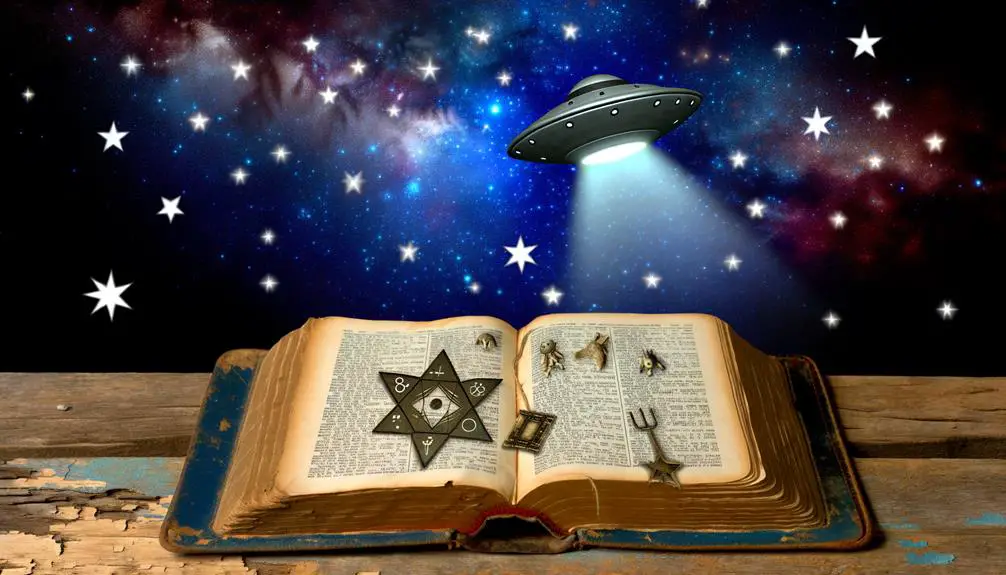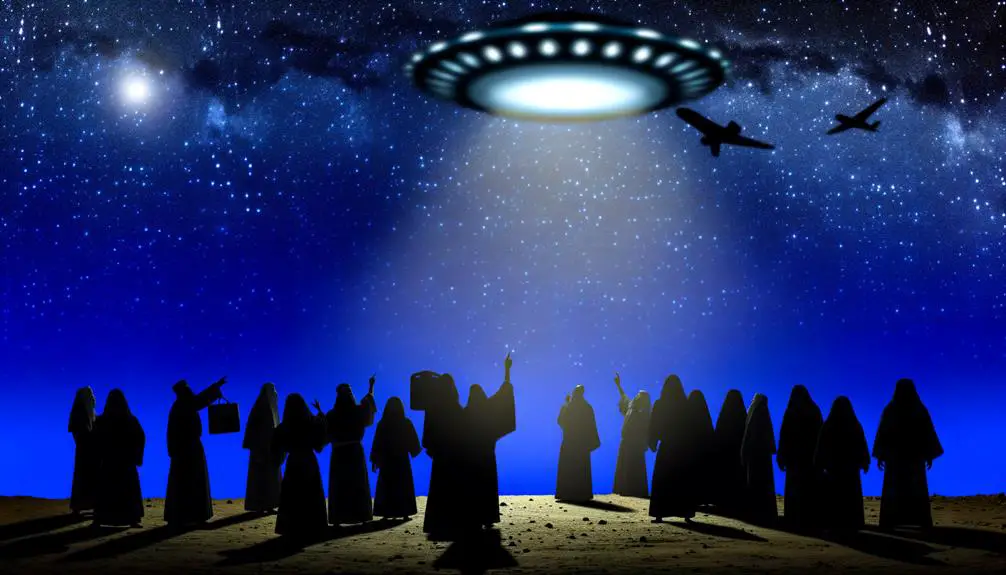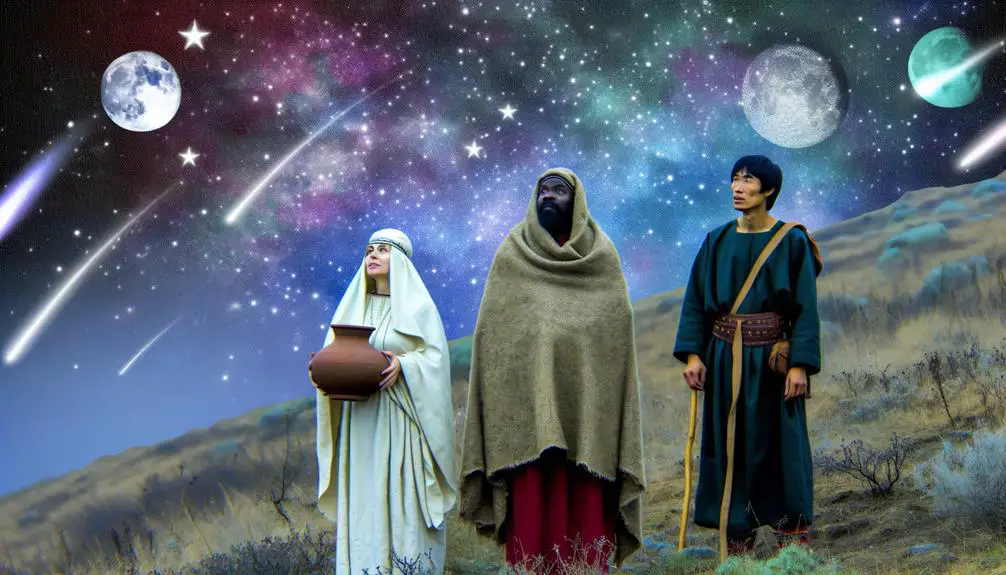Journey through biblical texts to uncover the debated presence of aliens—what secrets might ancient scriptures hold about otherworldly beings?

Do Aliens Exist in the Bible
You won't find explicit mentions of extraterrestrial beings in the Bible. However, some passages have been interpreted as potential alien encounters. Scholars argue that descriptions, like those in the Book of Ezekiel's vision of a flying chariot, tend to be metaphorical rather than literal accounts of alien activity. Much of this comes from ancient symbolism used to explain the unexplained through divine or supernatural causes. Translation shifts over centuries have further nuanced these interpretations. When considering these texts, it's critical to examine the theological, historical, and cultural contexts. Exploring these aspects might offer you new insights into these ancient texts.
Key Takeaways
- The Bible does not explicitly mention extraterrestrial beings or modern concepts of aliens.
- Some passages, like Ezekiel's vision of a flying chariot, are interpreted by some as potential alien encounters.
- These interpretations often view biblical descriptions through the lens of angelic visitations or symbolic prophecy.
- Ancient texts may use symbolic language to describe phenomena that were not understood at the time.
- Scholarly consensus generally views these passages as metaphorical or theological rather than literal accounts of alien encounters.
Biblical Passages Interpreted as Alien Encounters

While there is no explicit mention of extraterrestrial beings in the Bible, certain passages have been interpreted by some as depicting potential alien encounters. You might find this surprising, given the historical and religious context of the texts. However, interpretations focusing on an extraterrestrial perspective often hinge on descriptions that are traditionally viewed through the lens of angelic interpretation or prophetic symbolism.
For example, the Book of Ezekiel describes a vision involving a flying chariot composed of wheels within wheels and powered by angels. This complex imagery has led some to theorize about ancient alien technology, especially when taken out of the traditional angelic context. However, scholarly analysis suggests that Ezekiel's descriptions were likely metaphorical, employing prophetic symbolism to convey divine authority and presence rather than documenting literal extraterrestrial visitations.
Similarly, the depiction of angels in the Bible often strays from the human-like figures you might expect. Their sometimes bizarre, otherworldly appearance has fueled alien theories, yet these descriptions are generally accepted by scholars as symbolic representations of divine beings, meant to underscore their supernatural origin and purpose, rather than to document actual aliens. Therefore, while intriguing, the alien interpretation lacks substantial support within the academic community.
Historical Context of Alleged Alien References
Exploring the historical context of alleged alien references in the Bible helps us understand how ancient peoples might have interpreted unusual phenomena. When you investigate the era in which these texts were written, you'll find that ancient symbolism played an important role in how events were described. Phenomena that couldn't be explained with the existing knowledge or technology were often attributed to divine or supernatural causes. This perspective was not unique to the Biblical context but was a common trait across many ancient civilizations.
Moreover, you must consider the impact of translation errors over centuries. The original texts of the Bible were written in Hebrew, Aramaic, and Greek. As these texts were translated into other languages, nuances and meanings could have been inadvertently altered. Some words that might now conjure images of what modern culture would describe as 'aliens' could have originally referred to something entirely different in the context of the time. For instance, the Hebrew word often translated as 'chariot' might have not strictly meant a vehicle but could symbolize a divine or royal power, completely unrelated to any extraterrestrial connotations.
Understanding these elements sheds light on how interpretations can vary significantly, influenced by both cultural context and linguistic evolution.
Theological Perspectives on Extraterrestrial Life

Theological perspectives on extraterrestrial life often focus on interpretations of scripture that may challenge or expand traditional views of the universe and God's creation. You might find that theologians explore divine ontology—the nature and being of God—to investigate how the existence of extraterrestrial beings could fit within the framework of God's omnipotence and omniscience. If life exists beyond Earth, it raises profound questions about the universality of redemption and salvation. Is God's covenant with humanity exclusive, or is it conceivable that a parallel covenant could exist with other intelligent beings?
Eschatological implications also come into play when considering extraterrestrial life. The end times, as described in religious texts, primarily focus on Earth and humanity's future. However, the discovery of life elsewhere might necessitate a reevaluation of these prophecies. How would the second coming of Christ, for instance, resonate across the cosmos? Would other worlds be subject to the same judgment and resurrection described in Christian theology?
Understanding these complex theological questions requires a careful and nuanced interpretation of scriptures, keeping in mind the expansive possibilities of God's creation. As you explore these themes, you're engaging with a dynamic and continually evolving discourse that challenges the boundaries of traditional theological thought.
Scientific Analysis of Biblical Descriptions
Many biblical descriptions, when examined through a scientific lens, reveal intriguing insights into ancient understandings of the cosmos and natural phenomena. For instance, the depiction of the firmament in Genesis as a solid dome encasing the Earth reflects an early cosmological model that you can contrast with modern scientific knowledge of the atmosphere and outer space. This analysis not only enriches your understanding of the text but also challenges you to contemplate the impact of translation accuracy on our grasp of these ancient concepts.
In your exploration, you'll find that understanding the original Hebrew terms employed in these descriptions is essential. The term 'raqia,' often translated as 'firmament,' might not align perfectly with its original conceptualization due to shifts in language and understanding over millennia. This discrepancy raises questions about how closely modern interpretations and translations reflect the intent of the original authors.
Moreover, drawing modern parallels to these ancient texts can be enlightening. For example, Ezekiel's vision of a flying chariot, described with wheels and fire, might evoke images of modern spacecraft in popular culture. However, a scholarly approach highlights how these descriptions likely had more to do with symbolic religious imagery than literal accounts of alien technology. This serves as a reminder that the context and purpose behind biblical passages are key to their interpretation.
Cultural Impact of Aliens and Scripture Interpretations

Interpretations of scripture that suggest extraterrestrial influences have profoundly shaped cultural perceptions of both the divine and the unknown. The melding of religious symbolism with notions of otherworldly beings sparks a complex dialogue within societies, influenced heavily by modern media. You might find that these interpretations challenge traditional views and invite a broader understanding of spirituality and existence.
Here's how the integration of aliens into scriptural interpretations impacts culture:
- Expansion of Mythos: Religious texts are traditionally seen as sacred and unalterable. However, when you introduce the concept of aliens, it expands the mythos surrounding these texts. This not only adds layers to the narrative but also encourages you to question and explore the limits of established beliefs.
- Modern Media Influence: Films, books, and television shows that depict biblical events with extraterrestrial elements dramatically alter your perception of these stories. This media portrayal can shift the collective consciousness, making the idea of divine intervention intertwined with alien activity more palatable or even plausible.
- Interpretative Pluralism: The acceptance of extraterrestrial theories in scriptural contexts fosters a pluralistic approach to interpretation. You're encouraged to view ancient texts through various lenses, appreciating the potential multiplicity of meanings beyond traditional religious teachings.
This broadening of perspectives enriches cultural discourse, prompting reevaluation and often more inclusive interpretations of sacred writings.
Frequently Asked Questions
How Do Different Religions Interpret Aliens in Their Sacred Texts?
You'll find that various religions interpret aliens through sacred symbology and mythological parallels in their texts, often embedding these entities within the framework of spiritual beings or metaphysical concepts rather than literal extraterrestrials.
What Are the Earliest Recorded Claims of Alien Encounters?
You'd be astounded to learn that the earliest claims of alien encounters stretch back to ancient times, intricately woven into cultural myths and depicted on ancient artifacts, suggesting a longstanding human fascination with extraterrestrial life.
Are There Modern-Day Religious Leaders Who Believe in Aliens?
Yes, several modern-day religious leaders incorporate alien sermons and express clerical testimonies in their beliefs. They analyze and discuss extraterrestrial life, exploring its implications for faith and theological perspectives objectively.
How Do Alien Beliefs Influence Individual Spirituality?
Your spiritual authenticity may deepen by integrating alien beliefs, fostering a unique cosmic theology that enhances your understanding of the universe's vastness and your place within it, prompting profound, reflective spiritual exploration.
What Do Skeptics Say About Aliens and Religious Texts?
Skeptics, advocating scientific rationalism, question the textual authenticity of religious texts concerning aliens. They argue that interpretations are often subjective, lacking empirical evidence to align these texts definitively with extraterrestrial existence.



Sign up